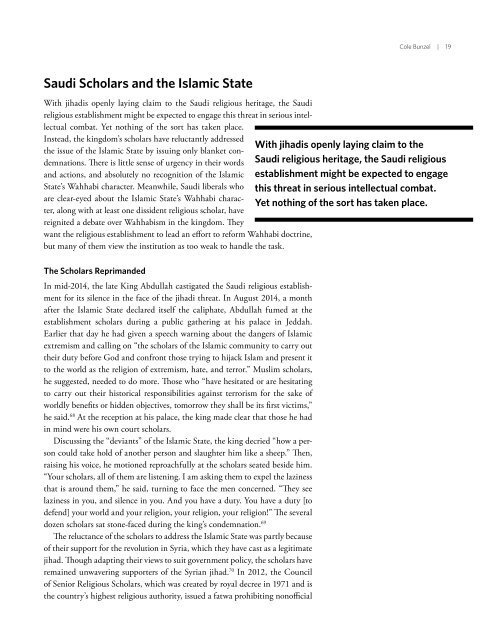Create successful ePaper yourself
Turn your PDF publications into a flip-book with our unique Google optimized e-Paper software.
Cole Bunzel | 19<br />
Saudi Scholars and the Islamic State<br />
With jihadis openly laying claim to the Saudi religious heritage, the Saudi<br />
religious establishment might be expected to engage this threat in serious intellectual<br />
combat. Yet nothing of the sort has taken place.<br />
Instead, the kingdom’s scholars have reluctantly addressed<br />
With jihadis openly laying claim to the<br />
the issue of the Islamic State by issuing only blanket condemnations.<br />
There is little sense of urgency in their words Saudi religious heritage, the Saudi religious<br />
and actions, and absolutely no recognition of the Islamic establishment might be expected to engage<br />
State’s Wahhabi character. Meanwhile, Saudi liberals who this threat in serious intellectual combat.<br />
are clear-eyed about the Islamic State’s Wahhabi character,<br />
along with at least one dissident religious scholar, have<br />
Yet nothing of the sort has taken place.<br />
reignited a debate over Wahhabism in the kingdom. They<br />
want the religious establishment to lead an effort to reform Wahhabi doctrine,<br />
but many of them view the institution as too weak to handle the task.<br />
The Scholars Reprimanded<br />
In mid-2014, the late King Abdullah castigated the Saudi religious establishment<br />
for its silence in the face of the jihadi threat. In August 2014, a month<br />
after the Islamic State declared itself the caliphate, Abdullah fumed at the<br />
establishment scholars during a public gathering at his palace in Jeddah.<br />
Earlier that day he had given a speech warning about the dangers of Islamic<br />
extremism and calling on “the scholars of the Islamic community to carry out<br />
their duty before God and confront those trying to hijack Islam and present it<br />
to the world as the religion of extremism, hate, and terror.” Muslim scholars,<br />
he suggested, needed to do more. Those who “have hesitated or are hesitating<br />
to carry out their historical responsibilities against terrorism for the sake of<br />
worldly benefits or hidden objectives, tomorrow they shall be its first victims,”<br />
he said. 68 At the reception at his palace, the king made clear that those he had<br />
in mind were his own court scholars.<br />
Discussing the “deviants” of the Islamic State, the king decried “how a person<br />
could take hold of another person and slaughter him like a sheep.” Then,<br />
raising his voice, he motioned reproachfully at the scholars seated beside him.<br />
“Your scholars, all of them are listening. I am asking them to expel the laziness<br />
that is around them,” he said, turning to face the men concerned. “They see<br />
laziness in you, and silence in you. And you have a duty. You have a duty [to<br />
defend] your world and your religion, your religion, your religion!” The several<br />
dozen scholars sat stone-faced during the king’s condemnation. 69<br />
The reluctance of the scholars to address the Islamic State was partly because<br />
of their support for the revolution in Syria, which they have cast as a legitimate<br />
jihad. Though adapting their views to suit government policy, the scholars have<br />
remained unwavering supporters of the Syrian jihad. 70 In 2012, the Council<br />
of Senior Religious Scholars, which was created by royal decree in 1971 and is<br />
the country’s highest religious authority, issued a fatwa prohibiting nonofficial



